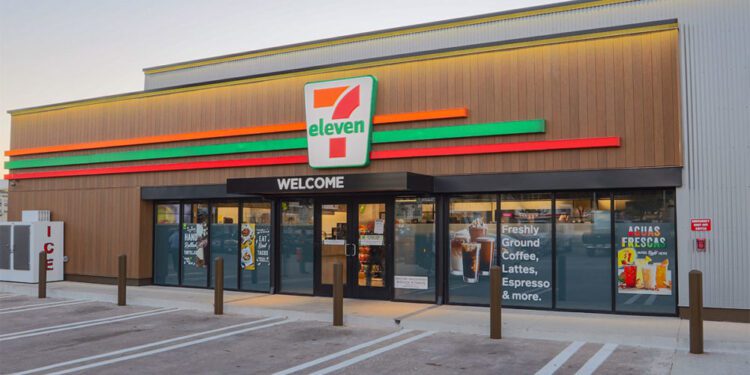The convenience store franchise 7-Eleven is set to shutter 444 locations throughout North America as a response to a notable increase in the number of underperforming stores. These closures are part of a larger growth initiative at 7-Eleven, with the company anticipated to boost its operating income by $30 million this year as a consequence, according to Restaurant Business.
In its recent earnings report, Seven & i Holdings, the parent organization of 7-Eleven, pointed to the chain’s lackluster performance being influenced by inflation and “a more cautious consumption behavior, especially among lower- and middle-income consumers.” The report highlighted consumers’ growing focus on quality, with 69% of survey participants expressing a desire for more premium options available in stores.
Revamping for a new generation: 7-Eleven’s transition from tobacco sales to fresh food
In response to six months of declining customer traffic, 7-Eleven plans to revitalize its offerings targeting a younger demographic, concentrating solely on consistently profitable locations to implement new innovations.
Facing a swiftly changing consumer market, 7-Eleven is adjusting its strategy to align with the expectations of Gen Z. McKinsey forecasts that by 2030, 75% of shoppers in emerging markets will be between the ages of 15 to 34, prompting the chain to adapt proactively in order to secure its future.
The recent stagnation in 7-Eleven’s growth can be linked to multiple factors, but a crucial downturn in revenue is due to the decreasing demand for its tobacco products. Historically reliant on tobacco sales as a fundamental element of its business framework, the chain is experiencing repercussions as smoking rates steadily decline. Since 2019, cigarette sales in the United States have decreased by 26%, with total packs sold dropping from 10.3 billion in 2019 to 7.6 billion in 2023. Gallup indicates that only around 6% of adults under 30 reported smoking cigarettes in the past week, a stark contrast to approximately 35% at the dawn of the millennium.
Future-proofing convenience: 7-Eleven’s plan for a changing market
Consequently, 7-Eleven is pivoting away from its focus on cigarettes and gasoline, dedicating itself entirely to expanding its food and beverage offerings—an initiative that initially began in April. Executives view this strategy as pivotal in shaping the chain’s prospects for the future, perceiving it as a vital route back to financial robustness.
“We’re developing signature products and leveraging promotions targeting a 17.5% increase in fresh food sales and a 7.7% rise in proprietary beverages compared to the previous year,” CEO Joseph DePinto stated during a fourth-quarter earnings call earlier this year.
This renewed emphasis on fresh food could be crucial for 7-Eleven. DePinto has noted that locations already involved in the company’s food and beverage modernization initiative—which includes enhancements in specialty coffee options, in-store baking, and improved grab-and-go displays—have significantly outperformed those that have not yet adopted these updates.
Establishing a sustainable business model for the future
7-Eleven is now striving to become a significant point of engagement for consumers in ways it has not previously pursued in North America. Modern shoppers demand more than just convenience; they desire unique experiences and, at times, the intrigue of the unexpected. To navigate this change, 7-Eleven can draw on a tried-and-true framework: the successful, food-centric model that has thrived in Japan for many years. 7-Eleven Japan prioritizes providing fresh, quality food to attract and engage customers.
“Convenience stores are increasingly elevating their offerings, competing directly with fast food and, at times, exceeding that standard,” Eric Steinbach, marketing director for Hormel Foods’ Foodservice division, elucidates. “Now, it’s transforming into a restaurant model that also provides gas,” he adds. However, with climate initiatives steering gasoline vehicles towards obsolescence and electric vehicles emerging as the inevitable next step, 7-Eleven may ultimately need to bid farewell to reliable gas sales too. This ongoing shift underscores the company’s urgent need to pivot towards new growth strategies.
7-Eleven aims to be perceived as a destination, not a last resort
“Our goal is to develop a store that customers are eager to visit, thanks to our selection of fresh food, innovative counter beverages, and exclusive brand items,” Ryuichi Isaka, president and CEO of 7-Eleven’s parent company, shared with The Japan Times. As consumer preferences evolve, today’s customers are increasingly seeking better value for their purchases—and this is a legitimate expectation.
However, 7-Eleven is not simply making adjustments or fine-tuning its service offerings. As mentioned earlier, the convenience store chain is systematically making a proactive transition towards a more sustainable business model. It is essential for retailers like 7-Eleven to move beyond superficial reinventions. A practical, consumer-focused strategy is crucial—one that resonates with contemporary consumers and avoids alterations made merely for the sake of being trendy. A significant part of this approach involves leaning into what has proven effective historically while maintaining relevance going forward. 7-Eleven must evolve into a brand that customers genuinely wish to purchase food from, rather than one they reluctantly depend upon.


